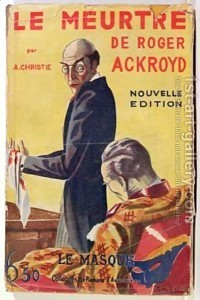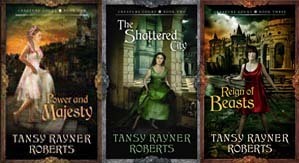Tansy Rayner Roberts's Blog, page 116
April 11, 2012
Agathon #7 – The Murder of Roger Ackroyd [1926]
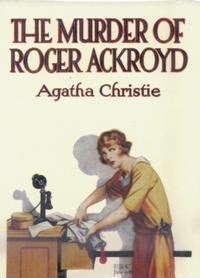 Kathryn and I have taken the challenge to read every book written by Agatha Christie, in order of publication and we're blogging as we go along. We spoil all the things! We're joined this time by guest reviewer Cranky Nick.
Kathryn and I have taken the challenge to read every book written by Agatha Christie, in order of publication and we're blogging as we go along. We spoil all the things! We're joined this time by guest reviewer Cranky Nick.
TANSY:
To me, this book is the first one that feels like an Agatha Christie to me – or at least, what I think of as an Agatha Christie. It's also one of a handful of her books where I knew going into it what the gimmick/trick to it was – as with The Orient Express, the solution to the murder is a matter of general pop culture knowledge.
[DID I MENTION SPOILERS??]
But I was impressed at how fun and interesting the novel was to read, even knowing the trick to it. I think Christie is quite devastatingly clever with this one (a dreadful precedent to have to live up to for her whole career) because the book seems designed to be reread with care, or read with the knowledge of the solution. It was far from a 'spoiler' – I knew that the narrator was the murderer, and yet I couldn't see for a good chunk of the novel how he had managed to do it, and unravelling the howdunnit was great fun.
I also really enjoyed the clever phrasing in which our unreliable narrator was concealing his acts – I could often spot where it was being done, but didn't always know what was being concealed.
One of the great misdirects of this novel is that Poirot treates Dr Sheppard (our narrator) as if he is a replacement figure for Hastings, who previously narrated his stories – indeed, he often tells us (by telling Sheppard) how similar the two men are, which encourages us to think of Sheppard as being both trustworthy and slightly dim. Though in fact, if you're reading (as I was) with a suspicious mind, it becomes fairly obvious that the two men aren't the least bit alike, and Poirot is messing with everyone's heads.
While I liked Hastings, I have to admit that the Poirot of this novel is my favourite so far – his intelligence and subtlety comes across much better than in the earlier books where he's really only smarter than Hastings (not hard). Here you see him really enjoying himself and stretching his intellect – and maybe this is the first time he's had a seriously worthy adversary?
I also enjoyed the cast of characters as a whole – Sheppard's relationship with his dizzy gossip of a sister Caroline, and all the social details that come across, and the many revelations that are unravelled in the course of the story. I can see why this one is so well known – while I have enjoyed reading her early books and the bizarre fluffy spyish romps, this is the first book where I get the sense that Christie has really got a handle on what she is doing.
I was also quite surprised at how readable Roger Ackroyd was, even when you know the twist. I originally read this when I was very young, but have always avoided a retread, because I assumed the novel wouldn't survive a spoiled ending – but that's certainly not the case.
Even when you know the twist, and you're looking for a way to trip up the narrator and "solve" the crime early, Roger Ackroyd is still a very engaging novel.
What mostly fascinates me with this book, though, is how much of a risk Christie was prepared to take with Poirot. Published in 1926 The Murder of Roger Ackroyd is only her sixth novel – and only the third including Poirot (there was also a collection of short Poirot stories, Poirot Investigates).
The Mysterious Affair at Styles and Murder on the Links were both narrated by Captain Alfred Hastings, in very much the tradition of Sherlock Holmes – with the "narrator as stooge" trope to the fore. Hastings often plays a role in the solution of the crimes in earlier works, but is almost never correct. The central character, though described through Hastings, is still Poirot.
Poirot was barely a character in Roger Ackroyd – he was described only partially by the narrator, who (for obvious reasons) didn't give the full insight into his character and actions that the earlier books, narrated by Captain Hastings, did.
Reading it again, it's clear how big a shift it was for Christie. To take what was becoming her defining character and relegate him to the sidelines, and to depart so radically from the earlier "narrator as stooge" theme was an extraordinarily bold step.
The flaws are the usual Christie ones – in particular, the side characters are little more than cardboard cutouts etc.
The wikipedia description pretty much sums them up, sadly
"The suspects include Mrs. Cecil Ackroyd, Roger's neurotic hypochondriac sister-in-law who has accumulated personal debts through extravagant spending; her daughter Flora; Major Blunt, a big-game hunter; Geoffrey Raymond, Ackroyd's personal secretary; Ralph Paton, Ackroyd's stepson and another person with heavy debts; Parker, a snooping butler; and Ursula Bourne, a parlourmaid with an uncertain history who resigned her post the afternoon of the murder.
The initial suspect is Ralph, who is engaged to Flora and stands to inherit his stepfather's fortune. Several critical pieces of evidence seem to point to Ralph. Poirot, who has just moved to the town, begins to investigate at Flora's behest."
None of them really move beyond those fairly shallow descriptions. I had some hopes for James Sheppard's sister, Caroline, the village gossip – but she largely disappears from the narrative by the end.
It's still a very readable book, though, well worth reading again.
Roger Ackroyd is one of the quintessential Christie novels. The setup is entirely traditional – there's a big house in the English countryside, an excellent assortment of hangers on and poor relations for suspects, and a lovely, changeable timeline of alibis and non-alibis. And right in the middle of this, Christie swings out perhaps the biggest twists in who-dunnit-storytelling of its time (apparently there were complaint letters to The Times upon publication!). I've read Ackroyd several times over the years so rereading it for review now was interesting because, not only did I know who the murderer was, I'm sufficiently familiar with the book to remember when Dr Sheppard (and Christie) is diddling us. I did wonder if this would make the experience anticlimactic, and to be honest I do feel some regret that I can't have the revelation that I presume I felt on my first reading because, unfortunately, I have no recollection of my first time. However, I still think this is Christie's strongest work to date, so it was still a pleasure to work through the book and watch what she did.
Probably my biggest surprise for this work is that it's only Christie's 3rd Poirot novel, and only her 7th book overall (including one collection of shorts). In my mind Ackroyd sits much later in oeuvre – probably partly because it is one of her classics, but also because Poirot is described as being so old! He's come to King's Abbot to retire, Hastings has run off to Argentina (presumably with Cinderella). It feels like things are winding down for Poirot, yet Christie will be writing about him for another 50-odd years.
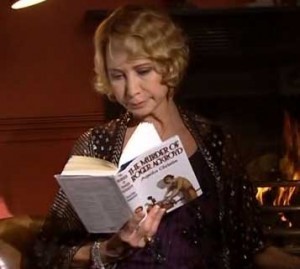 Regardless of the twist, I found the novel itself is very entertaining and funny. Some of my favorite scenes are when Dr Sheppard is describing the behaviour and opinions of his sister, Caroline. The evening game of mahjong in particular hugely entertaining, while the running joke of Poirot being a retired hairdresser is also very fun. I think Christie does an excellent job with Dr Sheppard. When he's not murdering people, he has a gently snarky humor and he's a lot cleverer than Hastings (poor Hastings!) Combine that, with his relatively awful sister, and Dr Sheppard is a very sympathetic character – which is another way Christie has pulled the wool over the reader's eyes. Having said that, I've always been particularly concerned how Caroline took the news that her brother was a murderer (and – perhaps worse – a blackmailer). I've always been afraid that she would have been completely undone by the revelation, which is of course ridiculous because she is Not Real!!
Regardless of the twist, I found the novel itself is very entertaining and funny. Some of my favorite scenes are when Dr Sheppard is describing the behaviour and opinions of his sister, Caroline. The evening game of mahjong in particular hugely entertaining, while the running joke of Poirot being a retired hairdresser is also very fun. I think Christie does an excellent job with Dr Sheppard. When he's not murdering people, he has a gently snarky humor and he's a lot cleverer than Hastings (poor Hastings!) Combine that, with his relatively awful sister, and Dr Sheppard is a very sympathetic character – which is another way Christie has pulled the wool over the reader's eyes. Having said that, I've always been particularly concerned how Caroline took the news that her brother was a murderer (and – perhaps worse – a blackmailer). I've always been afraid that she would have been completely undone by the revelation, which is of course ridiculous because she is Not Real!!
COMING NEXT:
The Big Four (1927)
[Hercule Poirot, Arthur Hastings, Chief Inspector Japp]
The Mystery of the Blue Train (1928)
[Hercule Poirot]
The Seven Dials Mystery (1929)
[Eileen "Bundle" Brent, Superintendent Battle]
Partners in Crime (1929)
[apparently the main character is a mystery!]
April 8, 2012
Hugo Nominations Out – What Will You Wear?
Sadly the outfit I will probably wear to the Hugos this year involves pyjamas and ug boots, cos I'm certainly not going all the way to Chicago, but, but BUT…
Galactic Suburbia was nominated for Best Fancast.
This is a dizzying and most splendid honour, and all four of us, presenters and producer, are tickled pink.
Congratulations to everyone on the shortlists, especially our fellow nominees in the Fancast category:
Best Fancast (326 ballots)
The Coode Street Podcast, Jonathan Strahan & Gary K. Wolfe
Galactic Suburbia Podcast, Alisa Krasnostein, Alex Pierce, and Tansy Rayner Roberts (presenters) and Andrew Finch (producer)
SF Signal Podcast, John DeNardo and JP Frantz, produced by Patrick Hester
SF Squeecast, Lynne M. Thomas, Seanan McGuire, Paul Cornell, Elizabeth Bear, and Catherynne M. Valente
StarShipSofa, Tony C. Smith
There is dancing, much dancing, and joyful celebration. Also, there will be HUGO PINS, that most exciting sartorial item. I also love that my Twitter feed has filled up with people talking about the acquisition of frocks for the ceremony.
The most splendid Karen Healey and I chatted this morning (in one of my brief holiday internet windows) about the importance of wearable tokens of awards, and how all literary awards could be GREATLY IMPROVED. You can read a cut down version of our conversation here.
April 6, 2012
Creature Court Available in UK & US
The Creature Court trilogy is now available in the UK & US on the Kindle. This is hugely exciting for me, because it's very hard for people outside Australia to access books that are only published here – bless the handful of you who utilised carrier pigeons, magic carpets and bricks-and-mortar to get hold of hard copies.
Hopefully HarperCollins will make the books available in other e-formats as well, later in the year. In the meantime, if Kindle is your e-reader of choice, go forth and explore the Creature Court!
I'd also appreciate any signal boosting my existing readers feel comfortable with – trying to promote the wider availability of books that have been out for some time is a tricky thing. I'm planning some fun promotional stuff over the next few weeks but in the mean time – if you have read the Creature Court and you liked it a lot, now would be a great time to tell others about it!
Book One – Power and Majesty
Book Two – The Shattered City
Book Three – Reign of Beasts
April 5, 2012
5 Books that Changed My Life
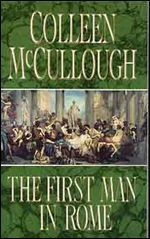 1. The First Man of Rome (and sequels) by Colleen McCullough
1. The First Man of Rome (and sequels) by Colleen McCullough
A gift from my Aunt and Uncle, a massive hardback that had some very adult scenes considering I was probably in my early teens. Inspired a lifelong obsession with Rome, the women in Roman history, and Julius Caesar. Certainly led to me choosing Ancient Civilisations at college, which led to my eventual PhD in Classics. All your fault, McCullough!
2. Shapechangers, by Jennifer Roberson
The first fantasy series I read because I was actively looking for fantasy fiction, rather than because I needed to read David Eddings so I could join in the conversation with my friends at school. I still remember being so inspired by this series that, after everyone had gone home after my fourteenth birthday party, I lay down on a pile of mattresses and started writing my own first real novel.
3. The Madigal, by Beverley McDonald
A paperback found in the book section of Myer, the first time I realised that Australians could write fantasy and get it published by an Australian publisher (I think Pan Macmillan)? Heady, brain-altering revelations, in a pre-Voyager world. I started thinking that my secret dream might be closer than I thought.
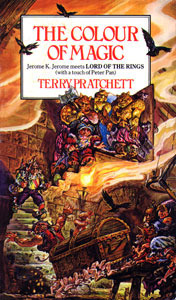 4. The Colour of Magic, by Terry Pratchett
4. The Colour of Magic, by Terry Pratchett
Just as I was getting completely overwhelmed by a glut of fantasy reading, and starting to suspect that my favourite genre wasn't quite as shiny as I thought, here came Mr Pratchett to blow my mind with the idea that you could write fantasy that was funny and subversive and commented on the genre itself. The next fantasy novel I would start writing was one which turned the cliches of my earlier manuscripts on their head, and also the one that would get me published for the first time…
5. Up the Duff, by Kaz Cooke
The older I get, the less likely I am to find books that have an enormous, life-changing effect on me, but this was the one that made me feel sane about being pregnant, and at the time that felt like a pretty major achievement.
Has one book (or many) ever changed your life significantly?
The Force is With Friday Links
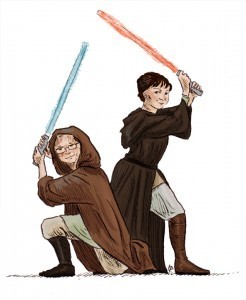 Is this not the best author picture EVER? It's an illustration by the wonderful Kathleen Jennings from this post at Angela Slatter's blog, interviewing Australian media tie-in writers Sean Williams and Karen Miller about their individual work writing for the Star Wars universe. So very cool.
Is this not the best author picture EVER? It's an illustration by the wonderful Kathleen Jennings from this post at Angela Slatter's blog, interviewing Australian media tie-in writers Sean Williams and Karen Miller about their individual work writing for the Star Wars universe. So very cool.
(and reminds me it might be time to send my CV to Big Finish again, begging them to let me write a Blake's 7 novel – you don't get if you don't ask!)
The Locus Kickstarter project to restore & archive a huge collection of photographs and ephemera has already met its target, which is fantastic, but they have many other projects in mind so it's not too late to sign up to support them.
Sean the Blogonaut talks about his platform in running for NAFF (the National Fan Fund) and links to where you can vote or support the fan fund. I'm voting this year, for sure! Check out the candidates for yourself.
Some gems from regular linkee Sarah Rees Brennan: a Sleuth Thursday post on Roxanne Ritchi of Megamind, and a very inspiring Tumblr post about embarrassing yourself on the internet.
A wonderful radio interview with Lalla Ward, mostly about the recent release of the novelisation of Shada (she read the audio book) but also about her history with Doctor Who, and with her dear friend Douglas Adams. Worth it too for her reaction to the question 'so you were married to Tom Baker?'
Seanan McGuire talks about the importance of actual, open sexual diversity in fiction.
Which leads well into this discussion of gay characters in YA dystopia over at the Outer Alliance. Lee Wind has done a follow up post looking at some of the other blog responses.
Foz Meadows talks about normative sexism in geek culture.
There's a new Tumblr celebrating Diana Wynne Jones life, books and career.
And now, a blast from the past, courtesy of Calapine:
April 4, 2012
Elsewhere on the Internet: Reviews, Interviews, Stray Time Lords
 Some links of things to do with me (tangentially or otherwise) on the internet this week:
Some links of things to do with me (tangentially or otherwise) on the internet this week:
A very positive review of Beyond Binary at i09 – doesn't mention my story at all (sniff) but it's great to see such a positive reaction to this book, which I'm very proud to be part of.
Our Sean (yes, he's ours!) has interviewed New Zealand fantasy author Helen Lowe for Galactic Chat.
A lovely, witty review of Love and Romanpunk – again, I've been so pleased at the critical reception for this book, and so very proud of it. I am always interested in the way that readers pick a favourite from the collection (there's something about the four story suite in particular, I think, that makes people pick out one sweetie over the rest).
Over at Doctor Her, I'm back on the Domesticating the Doctor kick with a short essay about Human Nature/Family of Blood and the Doctor vs. Domesticity. Next one will tackle the Ponds, really truly, I'm not avoiding it or anything!
March 31, 2012
Galactic Suburbia – quick picks from the best of 2011
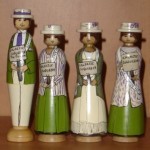 If you're just joining us, and want to try out Galactic Suburbia for the first time, here are the top episodes that we think represent the best of 2011.
If you're just joining us, and want to try out Galactic Suburbia for the first time, here are the top episodes that we think represent the best of 2011.
Episode 32: 11 May 2011 In which we bid farewell to Joanna Russ, talk e-publishing (again) and Alisa reads a real live actual book. With bonus raving about Doctor Who and Alistair Reynolds – in other words, another episode of Galactic Suburbia.
Episode 36: Spoilerific Book Club: Joanna Russ Featuring: "How To Suppress Women's Writing," by Joanna Russ; "The Female Man," by Joanna Russ and "When it Changed," by Joanna Russ
Episode 47: 24 November 2011 In which we bid farewell to the queen of dragons, squee about 48 years of Doctor Who, dissect the negative associations with "girly" fandoms such as Twilight, and find some new favourites in our reading pile.
Or if you're feeling adventurous, you can check out our entire 2011 catalogue of episodes! Thanks to our silent producer for gathering those links.
March 29, 2012
Friday Links Loves Talking Ponies
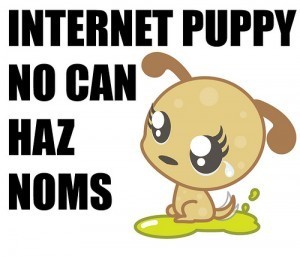 So the big SF news on the internet this week is apparently not the release of the Clarke Award shortlist, but that Christopher Priest does not approve of the Clarke Award shortlist. Scalzi and Charles Tan discuss both the rant itself and the responses to it. Cheryl Morgan looks at the piece as part of a larger tradition of deciding award decisions are WRONG.
So the big SF news on the internet this week is apparently not the release of the Clarke Award shortlist, but that Christopher Priest does not approve of the Clarke Award shortlist. Scalzi and Charles Tan discuss both the rant itself and the responses to it. Cheryl Morgan looks at the piece as part of a larger tradition of deciding award decisions are WRONG.
Personally, as someone who has judged a bunch of awards, I think that critiquing shortlists is fair game, because there's no completely objective definition of 'best', but suggesting that the decisions are wrong, incompetent or should in some way not count is the height of arrogance because, you know, THERE'S NO COMPLETELY OBJECTIVE DEFINITION OF BEST. And it's amazing how often these critiques come down to "people with different opinions to me are stupid/wrong" which isn't an overly healthy attitude. At the point you're suggesting that the judges should be fired and their decisions overturned… gah. No. Not okay.
On the other hand, internet rants are fascinating when they're happening to other people. So there's that. And sometimes there are t-shirts. By far the most measured, well-crafted and nuanced response I have seen in response to the Priest post, however (and one which made me seriously reconsider my use of the word 'rant') is by Catherynne Valente, who brings up all kinds of really interesting angles to the story that I hadn't considered before. I really think she is becoming one of our most important commentators on the field.
Speaking of nuanced criticism, Maggie Stiefvater's first response to the Hunger Games film and the audience she saw the movie with is really interesting. Certainly worth considering if you're over all the 'it should have been more violent' complaints of the movie.
There's a great discussion on the Australian Women Writers blog about romance, and whether it's feminist or not, being a genre all about women's point of view (readers, writers and characters), but one that sometimes promotes unfeminist ideas. (You mean supporting women's rights to CHOOSE what they read even if it's bad for them might be feminist???)
Jennifer Mills interrogates the gender essentialism that sometimes surrounds discussions of women's writing.
Back on the Australian Women Writers blog, Margo Lanagan writes a beautiful and lyrical review of Kate Forsyth's new book, Bitter Greens.
Sofia Samatar writes thoughtfully about religion and fantasy, and how we need to broaden our definitions of "religion" in order to properly discuss this particular issue.
N.K. Jemisin talks about the problematic nature of the 'strong women characters' stereotype, or indeed any stereotype, and how fictional ideas can have quite horrible ramifications in real life.
There's a new page up on the SF Encyclopedia! Check out 'Women SF Writers,' edited by Helen Merrick. And no I'm not just linking to it because I'm mentioned. Not at all.
Stephanie Smith, commissioning editor/associate publisher who has shaped HarperCollins Voyager (and Australian commercial fantasy as a whole) over the last seventeen years or so, is retiring. Check out the post on the Voyager blog in which many fantasy authors (including me) comment on what they owe to Steph. Truly the end of an era!
And to close by cheering everyone up, check out this post about how batshit freaky the Superman/Lois Lane relationship used to be way back when. Wow. Just wow.
In closing, how wonderful to be able to celebrate the opening of a new indie SF bookshop! Notions Unlimited in Melbourne [Notions Unlimited, Shop 9, Chelsea Beach Arcade, Chelsea, Victoria Australia] recently opened under the management of SF/horror writer Chuck McKenzie, and you can check out their launch video below along with some chat by a bunch of customers & Aussie spec fic writers about what they want from a bookshop.
March 28, 2012
Elsewhere on the Internet: Worldbuilding, Short Stories and the Women of Doctor Who
Two posts at Doctor Her this last week. I reviewed the only Big Finish play which portrayed the Doctor as a woman: Exile, starring Arabella Weir, in "That Other Time The Doctor Was a Lady." I also looked back at all the times (well okay, not THAT many) when the Doctor was accompanied by more than one female companion, in "Two Women in the TARDIS."
Meanwhile, I guest-posted at David McDonald's blog, with Eyries, Theatres & Worldbuilding as Plot. (omg on linking to it I went to look at it for the first time and just read David's glowing introduction. Thank you so much! I am heartily embarrassed, which is exactly what you want from an introduction)
I also started reading for Last Short Story 2012 and made some story recommendations from the first 3 months of Clarkesworld, Apex and Strange Horizons.
March 24, 2012
Watching New Who: The Shakespeare Code & Gridlock
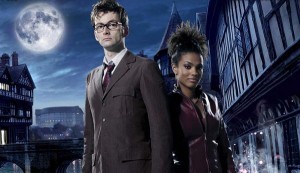 "The Shakespeare Code" – Season three, episode two
"The Shakespeare Code" – Season three, episode two
The Doctor – David Tennant
Martha Jones – Freema Agyeman
Shakespeare – Dean Lennox Kelly
TEHANI:
So, Martha's first adventure and we get Shakespeare! There's a lot to like about this episode. Ten is clearly enjoying himself on this one, and Martha does well for her first time travelling, don't you think? Asking the important questions for us not in TV-land and getting timey-wimey explanations in return.
TANSY:
Yes I like that Martha has a very down to earth and practical approach to time travel, and while she has just as much sense of wonder as Rose, there's a bit more of – I don't know, is it snobbish to say she feels more intellectual in how she takes in history? Less giggling, more cynical nodding.
TEHANI:
I don't think it's snobbish – true, maybe, but just another way to identify the differences between the companions I guess. Martha is better educated and a little more worldly than Rose, so showing Martha reacting quite differently to how we saw Rose reacting is reasonable.
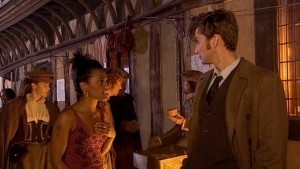 TANSY:
TANSY:
I also think it's important that Martha raises the race question early, and that the Doctor answers it – it's a little glib for him to suggest she just walk around like she own the place, because he's speaking from white male privilege, but at the same time it is important to note that there were people of colour (if not as many as now) in British history, and it's only a century of whitewashed movies and television that makes us think otherwise. Important that the race issue is addressed in the time travel stories, because pretending Martha isn't black would be bizarre. I rather like her "not exactly white, in case you haven't noticed" line because, let's face it, the Doctor probably WOULDN'T think about that sort of thing.
DAVID:
That's something I did wonder about, wouldn't Martha have stood out a little more than she did, not only because of her colour but because of what she was wearing? I would have thought both would have excited more reaction than they did. I'm quite happy to admit to be speaking from a lack of knowledge here, but I would have thought that London circa Shakespeare's time would be pretty homogeneous so I'd love to be pointed to some sources that talk about the history we don't see usually see in movies and TV, and perhaps our readers would like to as well (this is something I also wondered when watching the one episode of Merlin I've managed to catch)?
TANSY: I believe that there were certainly more faces of colour around in England in historical times than we are led to expect from 100 years of very whitewashed TV. Not common perhaps – but not especially extraordinary. I assume Shakespeare had to have met at least one black person in his life because, Othello. I did think it was cute that they framed Martha as Shakespeare's 'dark lady,' one of the figures he wrote so many sonnets to.
[ooh look, a source and a discussion of a book on Shakespeare & Race]
DAVID:
I am glad that in this episode they don't ignore such issues, I'd much rather they at least acknowledged these things rather than pretending they don't exist.
TEHANI: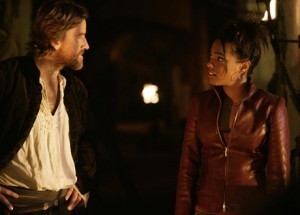 I adored Shakespeare, and the idea that he could completely hold his own with the Doctor. Smart, funny, and fairly easy on the eyes as well! Not to mentioned a little tormented – what more could a girl ask for?
I adored Shakespeare, and the idea that he could completely hold his own with the Doctor. Smart, funny, and fairly easy on the eyes as well! Not to mentioned a little tormented – what more could a girl ask for?
TANSY:
It's a great performance, I really like the actor's interpretation. It's a lot more warts-and-all than, for instance, good old Joseph Fiennes. Also bonus points for use of 'hey nonny nonny' as a pick up line.
DAVID:
I thought that the dialogue was one of the major strengths of this episode, as you would expect with episode featuring Shakespeare! The banter between all three of the main characters (Shakespeare, The Doctor and Martha) was brilliant throughout and was a real delight. And, as a writer, I loved the emphasis on the power of words and that was explored really well.
I liked the "unromanticised" Shakespeare we see here, as you say – warts and all. Another great guest performance! The temptation would have been to give us a modern interpretation of the Bard, cleaned and made more palatable to our modern sensibilities but instead we get a man of his times. I have to admit, I thought the scene with Martha and Shakespeare was hilarious, but it was also quite brave and illustrated some of the disconnect there would be with someone from an England that far back in time.
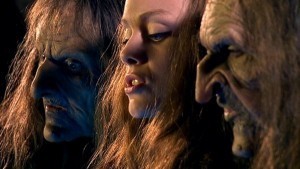 TEHANI:
TEHANI:
What did you think of the witches? I liked the young one – while she was pretty over the top in her evilness, it really worked for me – as in, she was genuinely invested in her crazy, so it made sense!
TANSY:
They're very cliche witches but of course one of the central origins of that cliche is Shakespeare's Macbeth, so it's important we see that in them. I have to say, I normally hate the trope of the Doctor inspiring famous writers/artists to do their best work, or even doing it for them, because it takes away from their own reputation to suggest the Doctor did it better – for the most part in this story it treads the right side of the line for me because of the humour in the way it's used and because the Doctor is at least doing it by accident. Chucking in a reference to the Sycorax is hilarious because it "explains" how an earlier alien race was named with a Shakespeare reference, and it helps that at one point the Doctor quotes a play Shakespeare actually recognises as his own.
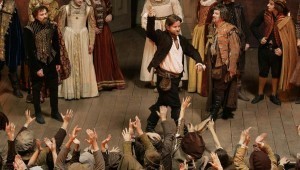 DAVID:
DAVID:
One of my friends is blogging Shakespeare, doing each of his plays in turn, and he was talking about how Love's Labours Lost is such an atypical play, and it that it does actually read as if part two is missing. I wasn't aware of that, obviously a hole in my education, but it does make me look at this episode in a whole new light.
TEHANI:
I think Doctor Who writers are a pretty clever bunch, even when you don't REALISE how clever they're being until it's pointed out to you – so many people are WAY smarter than me!
DAVID:
The way this episode provides so much banter and dialogue also fits in with the style of the play, the more I learn the more I admire the writer!
I do agree that having cliche witches in this makes sense, because they are the inspiration for the cliche itself. It's a pretty standard Who thing as well to treat magic as something that has a scientific basis, not supernatural or occult, but just a unfamiliar way of manipulating the Universe.
 TEHANI:
TEHANI:
The pop culture references are a nice touch – Shakespeare quoting JK Rowling, made of awesome! But my favourite line has to be:
Ten: Come on! We can all have a good flirt later!
Shakespeare: Is that a promise, Doctor?
Ten: Oh, fifty-seven academics just punched the air.
Way to break the fourth wall!!
I also really liked the underlying premise that words have power. It's not really subtle, but it's also only there if you think about it, if that makes sense, wrapped up as it is in a story about one of history's finest wordsmiths.
DAVID:
This episode was very pop culture heavy, wasn't it? But I thought they did it really well, there were no cringe worthy moments. And, besides, I love Harry Potter!
TANSY: The use of 'expelliamus' was awesome, and acknowledges I think how much Potter has sunk itself into our pop culture. It's quite nice to see the Doctor chatting about J.K Rowling instead of sticking to the more 'classic' Dickens and Shakespeare. Hmm. Do we think it's time the Doctor went back to check out Jane Austen and her crowd? She has to be the most popular famous writer that we haven't seen on the show yet!
DAVID:
Was this the first actual appearance of Shakespeare on the show? I know he has been referenced before, but I can't remember if he had made an appearance. I'd love to see Jane Austen on the show too.
TANSY:
No, he hasn't appeared, though the Doctor name-dropped him quite a few times and the Fourth Doctor claimed to have scribed Hamlet at his dictation (which was why the original manuscript was in his handwriting).
TEHANI:
I'm all for any Doctor Who set in our past with historical figures – they're my favourite episodes! Oh, David, just wait til we get to Leonardo!
TANSY:
Okay, I just officially put City of Death (Classic Who) on Tehani's shopping list.
TEHANI:
That list is growing scary big!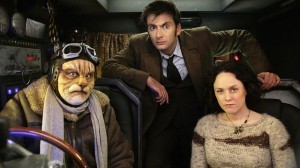 "Gridlock"
"Gridlock"
Season three, episode three
The Doctor – David Tennant
Martha Jones – Freema Agyeman
TEHANI:
Tansy, I'm cautious of doing this one! There's a really big important reason for this episode that only becomes clear later on! David, you won't know, don't worry 
Ten is a bit callous and heartbreaking in this one, but really, at least Martha can never say he led her on! At the same time, we get a bit of a return to some vulnerability about his past, which Tennant does well.
TANSY:
There are a few reasons I was keen to discuss Gridlock, apart from it feeling like one of the most solid pieces of science fiction we've seen for a long time in the show.
 The references to the Doctor's past and his discussion of Gallifrey make for a very powerful and emotional scene – it's interesting, actually, the idea that he has to have 'the talk' with each new companion, and what new information we as the audience get. Martha needs to know about Gallifrey AND Rose – good thing they didn't keep this up or you'd have him presenting a lecture with power point each time someone new joined him. "And this was Sarah Jane…"
The references to the Doctor's past and his discussion of Gallifrey make for a very powerful and emotional scene – it's interesting, actually, the idea that he has to have 'the talk' with each new companion, and what new information we as the audience get. Martha needs to know about Gallifrey AND Rose – good thing they didn't keep this up or you'd have him presenting a lecture with power point each time someone new joined him. "And this was Sarah Jane…"
DAVID:
Many things to like, wasn't there? For a start, the idea of an entire population trapped in a endless traffic jam was compelling and creepy, especially for someone who has spent some time on the Monash Freeway! I always love a story where we are presented with a society that seems ordered on the surface and we gradually get to see how the mechanisms beneath that hold it together are slowly breaking down – it reminded me a bit of Paradise Towers, actually. And, it's always nice to see a creature or villain from the Doctor's past.
The payoff was pretty good, actually, the idea of a last desperate ploy to save the uninfected from the plague, the surface dwellers throwing the switch to shut off the lane ways and not knowing whether they had succeeded in saving anyone. And, the sight of all those skeletons! As you say, there was some solid sci fi here, and some nice emotional resonance to go along with it. While Ten doesn't wear the traumas of his past on his sleeve quite the way that Nine did, the scene where he talks about Gallifrey does a great job of conveying the depths of his pain and gives a real sense of exactly how much he has lost.
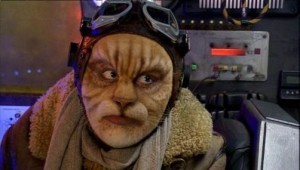 TEHANI:
TEHANI:
I'm still a huge fan of the cat people, and I loved the way mixed race (species!) marriage AND same sex marriage is portrayed here. Although the kittens were perhaps just a bit much…
TANSY:
The RTD era is great at those little touches that show there are more possibilities out there than many people think is traditional. I thought the kittens were pretty cute! It's a very clever episode, the way they used the same 'car' set over and over again to convey a whole society instead of showing us a planet through one family or one crew.
DAVID:
The contained nature of most of this episode was very clever, wasn't it? And it must have helped the budget too! I liked the little slices of life we got with each of the cars, and you really could imagine the way that a community would have formed with the radios as the only means of communication, and how no one would have cared what the person on the other end looked like or who they were marrying or any of that, they would have been simply a friendly voice in the dark, their shared experience and humanity the only important thing.
TANSY:
That's true actually, you get the feeling that Brannigan is a bit embarrassed about the lesbian old ladies (I'm an old fashioned cat) and can't quite acknowledge them as wives (they might feel the same way about he and his wife's relationship), but as they're all in it together none of them let their differences stop them being allies. It's more realistic than everyone feeling exactly the same about particular social issues.
The cleverness of the design used in the episode lifted it into something special for me, and I liked how we got to see so much of the society through the postcard glimpses of each car and crew. Great worldbuilding!
TEHANI:
This one wasn't one of my favourites, but I agree it's a good strong SFnal episode. The monsters were really an afterthought to the story at hand though, weren't they – a catalyst for the danger rather than the actual plot, which was pretty cool.
I liked that we got to see Novice Hame again, and the Face of Boe – I agree David, it's nice to see return characters!
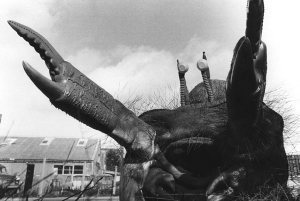 DAVID:
DAVID:
They are a great pair, but the other blast from the past is the Macra! They featured all the way back in the Doctor's Second Incarnation.
One of the things I have enjoyed about New Who is that, while they aren't constrained by it, they haven't ignored what has gone before and we have seen lots of little homages to Classic Who. The fact that the very first episode (Rose) featured an previously featured alien race set the tone, and was very reassuring for a Classic fan like myself, and that has continued.
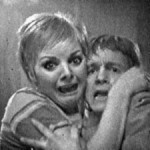 TANSY:
TANSY:
The Macra was so gratuitous! If even I have to go look up a reference … but of course it works fine without knowing the Doctor has seen them before (right, Tehani?) and I love all the self-reference stuff, anything that makes it feel more like it's the same universe (bar reboots & reality shifts) that he's always been bombing around in.
TEHANI:
Ohhhhh, so they're creatures from Classic Who, right! Yes, works fine – I kind of expect the Doctor to know everything about every creature/monster/alien/planet, so it never really occurs to me to wonder if the reason he knows about something is actually because he's encountered it before!
DAVID:
I have to admit to be slightly surprised by the use of the hymns "Abide with Me" and "The Old Rugged Cross" in this episode (though apparently "Abide with Me" was in Kinda!). I certainly didn't have an issue with it, and the idea of all the gridlocked travellers sharing an united moment is at once convincing and moving.
It's simply that "The Old Rugged Cross" in particular is an exceedingly Christian specific hymn, not one that you would consider interfaith, or ecumenically neutral, which says some interesting things about the society of New Earth. I am not sure that they would have thought quite that deeply, but I do wonder whether they picked it at random or whether there was a reason. It is a very English moment, too, you can imagine the same thing happening during the Blitz or on the deck of the Titanic.
It's a beautiful piece of music, though, and adds a great deal of poignancy to the Doctor's reminisces as he remembers, and mourns, Gallifrey.
TANSY:
I don't think anything about the soundscape of Doctor Who these days happens at random – they put so much time and thought into post-production. I agree it had a historical British feel about it, in a Blitz spirit kind of way. But, of course, all the futures in DW are British! (makes a change from American)
I didn't actually know whether they were 'real' hymns or not because I'm pretty ignorant about that sort of thing, but I thought they might be and it is a very interesting choice for them. It certainly worked in the moment, as far as the drama is concerned.
TEHANI:
The music is one thing that is something I'm noticing more and more during rewatch – I'm finding it frequently overpowers the action and dialogue onscreen, and I wonder why they make some choices. In this case it wasn't an issue, but I'll flag it for further discussion in other episodes!
So, onwards?
=======
Watching New Who – in conversation with David McDonald, Tansy Rayner Roberts and Tehani Wessely
David is coming to New Who for the first time, having loved Classic Who as a kid. Tehani is a recent convert, and ploughed through Seasons 1 to 6 (so far) in just a few weeks after becoming addicted thanks to Matt Smith – she's rewatching to keep up with David! Tansy is the expert in the team, with a history in Doctor Who fandom that goes WAY back, and a passion for Doctor Who that inspires us all (plus a seven-year-old daughter who is finding her own Doctors for the first time). We're going to work our way through New Who, using season openers and closers, and Hugo shortlisted episodes, as our blogging points. Just for fun! We have already talked about:
"Rose", S01E01
"Dalek", S01E06
"Father's Day, S01E08
"The Empty Child/The Doctor Dances", S01E09/10
"Bad Wolf/The Parting of the Ways", S01E12/13
Season One Report Card – David, Tansy, Tehani
"The Christmas Invasion," 2005 Christmas special
"New Earth", S02E01
"School Reunion," S02E03
"The Girl in the Fireplace", S02E04
"Rise of the Cybermen/Age of Steel", S02E05/06
Army of Ghosts/Doomsday, S02E12/13
Season Two Report Cards: David, Tehani, Tansy
"The Runaway Bride", 2006 Christmas Special
"Smith and Jones", S03E01

